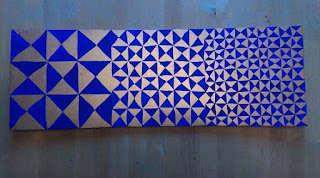My
story of Resistance Part 2
I became an Education Refuser.
I rejected reading, writing and number. It did not
make sense.
I was put in the Special Needs Class.
I couldn’t read well and not out loud and not the
books they gave us which I thought were facile, pointless and uninteresting and
teachers didn’t have time to explain. ‘Students
with dyslexia may avoid reading because it can be stressful and tiring. As a
result, they can end up missing valuable reading practice and fall behind their
classmates. This can hurt their self-esteem.’ (Gavin, 2013).
In the special needs class, we coloured-in and laid
tables (the wrong way round) for dinner. It was not really a class but about
five of us pupils, some with downs-syndrome or autism and me, who sat with a
dinner lady, we didn’t really do anything, we observed, marked time, waited for
lunchtime. I wondered why I was there.
Gavin (2013) believes that, ‘With the proper
assistance, most students with dyslexia can learn to read and develop
strategies that allow them to stay in regular classrooms.’ I was
confused but not upset, I liked being different, being away from difficult
classes where I didn’t understand what was going on and no one explained, staff
did not account for what was going on here either. I knew it wasn’t a
punishment, I wasn’t scared, just interested and puzzled, really, what was I
doing there?
By the end of primary school aged nine I could just
about read and write and do a very small amount of maths, ‘A child with dyslexia may have difficulty learning colours, shapes, and numbers; learning the
sequence and letter names of the alphabet; reading
and spelling words with the correct letter sequence.’ (Gavin 2013). I
couldn’t tell the time from analogue clock, digital clocks were quite new and
not commonplace, we had to learn analogue. I felt like I was entering a fog
bank every time I went to school.
State paternalism and a laissez faire attitude
(Morris, 1972) may have had an effect on my education. When reflecting on my
own story of resistance I realize the reason I didn’t fit the Primary school
mould, even at a very liberal educational establishment. There was what I call
a ‘filler’ policy to try and do the most, for the largest number of pupils;
like frosting a cake, smoothing over the lumps and valleys to create a uniform
even surface. However dyslexic students
like me fell between the cracks and had nowhere to go educationally, no
facility for teaching outside the norms of pupil ability, no differentiation
made to lessons.
My parents realized something was amiss
and sent me to a retired teacher every day of the summer holidays. One to one I
very slowly improved and practiced and got better. The pace was different, set
to my needs instead of the needs of the whole class where the teacher did not
have time to make sure I had understood.
Meanwhile my sister was praised as the ‘clever one’
of the family cementing the narrative in my head that I was the opposite and
should not try for academia.
During this time my parents had decided to send my
sister to a private school because she was quick and clever and bright and I
was not. My Mother put it to me like this, you would not enjoy private school,
you like art, you would hate the pressure. I think she was wrong, for several
reasons; the smaller class sizes would have been beneficial to my learning
style and dyslexia issues, I work well under pressure and respond to gentle
pushing. But possibly she was right, however this decision reinforced my ideas
about myself; that I am not clever, I am not quick and I am not academic. I
should not even think about trying to reach for those things, they are so far
out of my reach that they are unattainable, not for me, not my place, not my
role in life. From then on I resisted academia and reading and being clever, it
was not mine and I did not fight the judgement, I accepted it as my lot.




Comments
Post a Comment